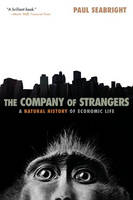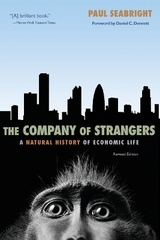
The Company of Strangers
Princeton University Press (Verlag)
978-0-691-11821-5 (ISBN)
- Titel erscheint in neuer Auflage
- Artikel merken
Human beings are the only species in nature to have developed an elaborate division of labor between strangers. Even something as simple as buying a shirt depends on an astonishing web of interaction and organization that spans the world. But unlike that other uniquely human attribute, language, our ability to cooperate with strangers did not evolve gradually through our prehistory. Only 10,000 years ago - a blink of an eye in evolutionary time - humans hunted in bands, were intensely suspicious of strangers, and fought those whom they could not flee. Yet since the dawn of agriculture we have refined the division of labor to the point where, today, we live and work amid strangers and depend upon millions more. Every time we travel by rail or air we entrust our lives to individuals we do not know. What institutions have made this possible? In The Company of Strangers, Paul Seabright provides an original evolutionary and sociological account of the emergence of those economic institutions that manage not only markets but also the world's myriad other affairs.
Paul Seabright is Professor of Economics at the University of Toulouse, France. Formerly a Fellow of All Souls College, Oxford, and of Churchill College, Cambridge, he is a contributor to the "London Review of Books".
Acknowledgments ix Introduction 1 PART I: Tunnel Vision 11 Chapter 1 Who's In Charge? 13 Prologue to Part II 27 PART II: From Murderous Apes to Honorary Friends: How Is Human Cooperation Possible? 29 Chapter 2 Man and the Risks of Nature 31 Chapter 3 Murder, Reciprocity, and Trust 48 Chapter 4 Money and Human Relationships 67 Chapter 5 Honor among Thieves: Hoarding and Stealing 78 Chapter 6 Professionalism and Fulfilment in Work and War 87 Epilogue to Parts I and II 99 Prologue to Part III 103 PART III: Unintended Consequences: From Family Bands to Industrial Cities 107 Chapter 7 The City, from Ancient Athens to Modern Manhattan 109 Chapter 8 Water: Commodity or Social Institution? 123 Chapter 9 Prices for Everything? 137 Chapter 10 Families and Firms 153 Chapter 11 Knowledge and Symbolism 174 Chapter 12 Exclusion: Unemployment, Poverty, and Illness 190 Epilogue to Part III 209 Prologue to Part IV 211 Part IV: Collective Action: From Belligerent States to a Marketplace of Nations 215 Chapter 13 States and Empires 217 Chapter 14 Globalization and Political Action 233 Conclusion: How Fragile Is the Great Experiment? 245 Notes 259 Bibliography 279 Index 295
| Zusatzinfo | 6 halftones. 2 line illus. |
|---|---|
| Verlagsort | New Jersey |
| Sprache | englisch |
| Maße | 152 x 235 mm |
| Gewicht | 567 g |
| Themenwelt | Geschichte ► Teilgebiete der Geschichte ► Wirtschaftsgeschichte |
| Sozialwissenschaften ► Soziologie | |
| Wirtschaft ► Allgemeines / Lexika | |
| ISBN-10 | 0-691-11821-3 / 0691118213 |
| ISBN-13 | 978-0-691-11821-5 / 9780691118215 |
| Zustand | Neuware |
| Haben Sie eine Frage zum Produkt? |
aus dem Bereich



